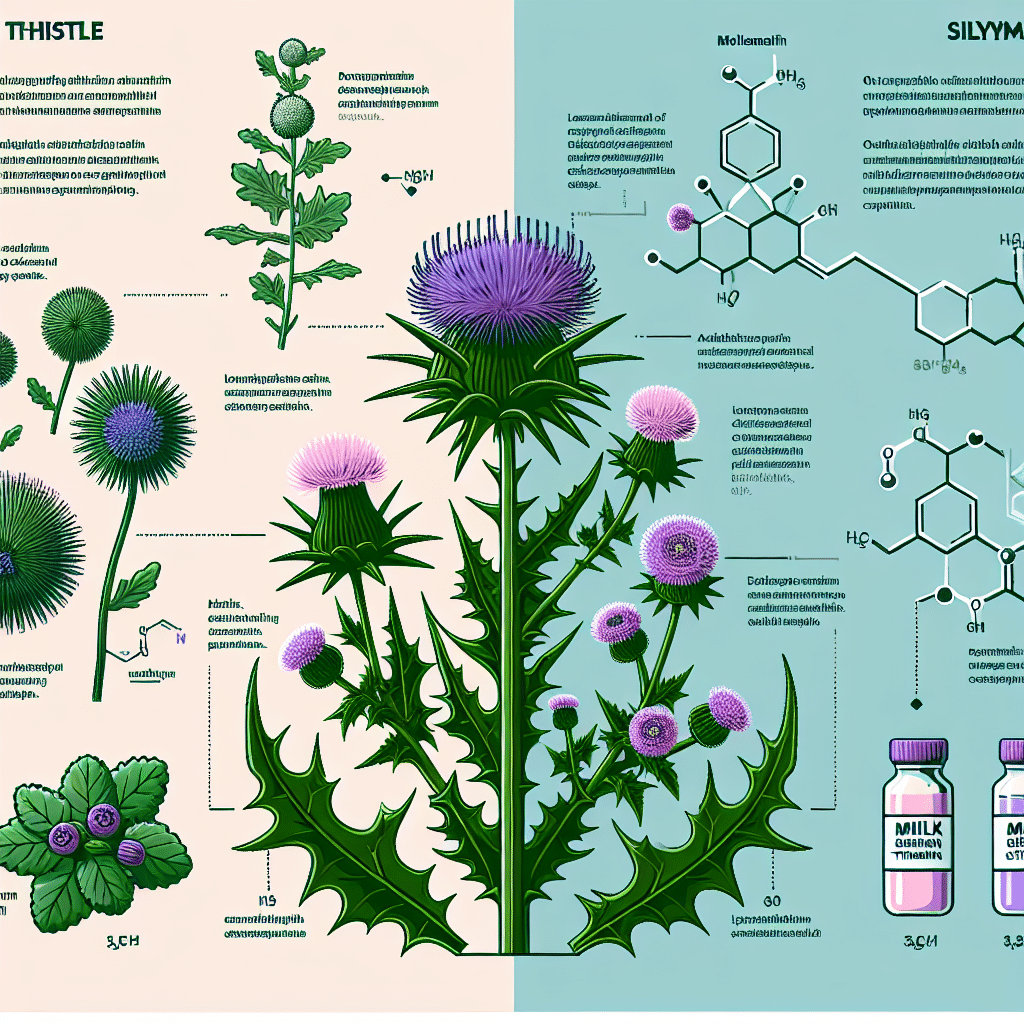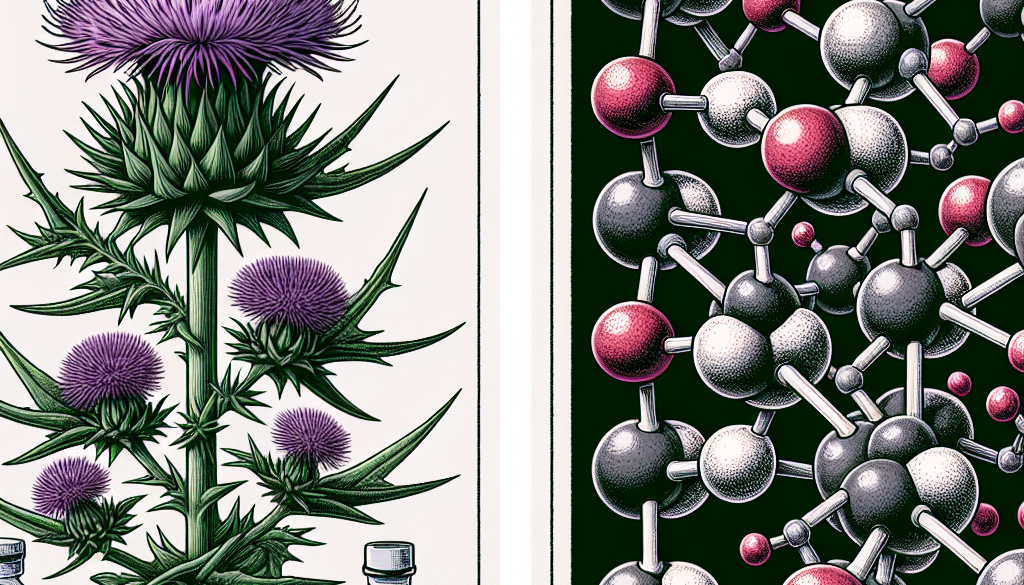Milk Thistle vs Silymarin: Key Differences
-
Table of Contents
- Milk Thistle vs Silymarin: Understanding the Distinctions
- What is Milk Thistle?
- What is Silymarin?
- Key Differences Between Milk Thistle and Silymarin
- Health Benefits of Milk Thistle and Silymarin
- Usage and Dosage
- Side Effects and Interactions
- Case Studies and Research
- Conclusion: Milk Thistle and Silymarin in Perspective
- Discover ETchem’s Protein Products
Milk Thistle vs Silymarin: Understanding the Distinctions

Milk thistle and silymarin are often mentioned together in discussions about liver health and herbal supplements. While they are closely related, they are not the same thing. This article will delve into the key differences between milk thistle and silymarin, their benefits, and how they are used in various health applications.
What is Milk Thistle?
Milk thistle (Silybum marianum) is a flowering plant native to Mediterranean countries. It has been used for over 2,000 years as a herbal remedy for a variety of ailments, particularly liver problems. The plant is distinguished by its purple flower and white-veined leaves, from which its name is derived. The active ingredients in milk thistle are a group of plant compounds collectively known as silymarin.
What is Silymarin?
Silymarin is the bioactive compound found in the seeds of the milk thistle plant. It is a complex mixture of flavonolignans, which includes silybin, silydianin, and silychristin, with silybin being the most active and abundant component. Silymarin is extracted from the plant’s seeds and is commonly available in supplement form.
Key Differences Between Milk Thistle and Silymarin
- Composition: Milk thistle is the whole plant, while silymarin is a specific extract from the seeds of the plant.
- Usage: Milk thistle can be consumed in various forms, including as a tea or in a ground-up form. Silymarin is typically found in concentrated supplement form.
- Concentration: Silymarin contains a higher concentration of the active compounds that are believed to provide health benefits, compared to the whole milk thistle plant.
Health Benefits of Milk Thistle and Silymarin
Both milk thistle and silymarin are best known for their potential benefits to liver health. Here are some of the ways they may help:
- Liver Protection: They are thought to protect the liver from toxins and promote liver cell regeneration.
- Antioxidant Effects: They have antioxidant properties that may help reduce free radical damage.
- Anti-inflammatory: They may reduce inflammation, which is beneficial for liver health and other conditions.
Studies have also explored the use of milk thistle and silymarin in treating liver diseases such as cirrhosis, jaundice, hepatitis, and gallbladder disorders. However, while there is some promising research, more studies are needed to conclusively determine their effectiveness.
Usage and Dosage
The dosage of milk thistle and silymarin can vary depending on the form and concentration of the product. It’s important to follow the manufacturer’s instructions or consult with a healthcare provider before starting any new supplement regimen.
Side Effects and Interactions
Milk thistle and silymarin are generally considered safe when taken in appropriate doses. However, they can interact with certain medications and may not be suitable for everyone. Possible side effects include gastrointestinal issues, allergic reactions, and headaches.
Case Studies and Research
Several studies have investigated the effects of milk thistle and silymarin on liver health. For example, a study published in the “World Journal of Hepatology” found that silymarin can have a positive effect on alcoholic liver disease. Another study in the “Journal of Hepatology” suggested that silymarin might help reduce liver inflammation and fibrosis in patients with chronic liver disease.
Conclusion: Milk Thistle and Silymarin in Perspective
In summary, milk thistle is a plant known for its liver-protective qualities, and silymarin is the active compound extracted from its seeds. While they are related, they differ in form, concentration, and how they are used. Both have shown potential in supporting liver health, but silymarin offers a more concentrated form of the active ingredients. As with any supplement, it’s important to consult with a healthcare provider before use.
Discover ETchem’s Protein Products
If you’re interested in enhancing your health regimen, consider exploring ETchem’s range of protein products. ETchem is a reputable manufacturer and supplier of high-quality collagens, including marine, fish, bovine, chicken, and various types of collagen. Their products are known for their neutral taste and instant solubility, making them a great addition to any health-focused lifestyle.
About ETChem:
ETChem, a reputable Chinese Collagen factory manufacturer and supplier, is renowned for producing, stocking, exporting, and delivering the highest quality collagens. They include marine collagen, fish collagen, bovine collagen, chicken collagen, type I collagen, type II collagen and type III collagen etc. Their offerings, characterized by a neutral taste, instant solubility attributes, cater to a diverse range of industries. They serve nutraceutical, pharmaceutical, cosmeceutical, veterinary, as well as food and beverage finished product distributors, traders, and manufacturers across Europe, USA, Canada, Australia, Thailand, Japan, Korea, Brazil, and Chile, among others.
ETChem specialization includes exporting and delivering tailor-made collagen powder and finished collagen nutritional supplements. Their extensive product range covers sectors like Food and Beverage, Sports Nutrition, Weight Management, Dietary Supplements, Health and Wellness Products, ensuring comprehensive solutions to meet all your protein needs.
As a trusted company by leading global food and beverage brands and Fortune 500 companies, ETChem reinforces China’s reputation in the global arena. For more information or to sample their products, please contact them and email karen(at)et-chem.com today.




